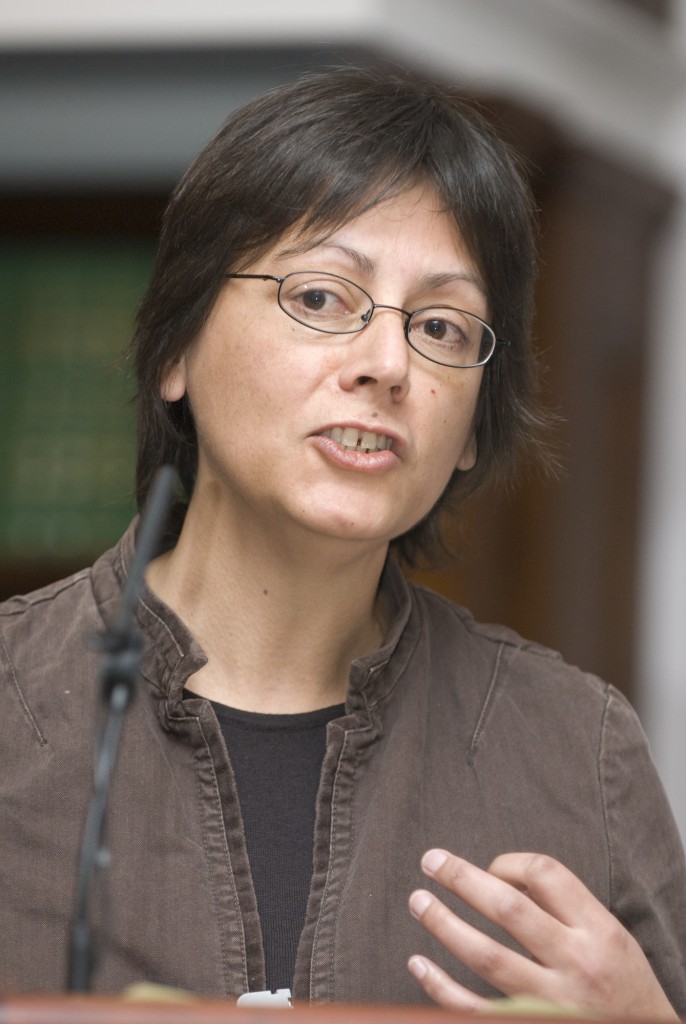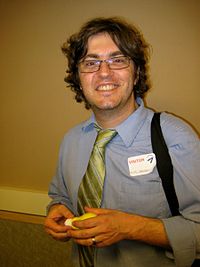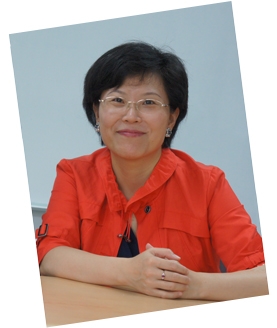:::ICCE 2014
Keynote Speakers
C2 : ICCE Conference on Computer-supported Collaborative Learning (CSCL) and Learning Sciences |
|

|
Designs for Principle‐Based Innovation in Education Marlene SCARDAMALIA OISE/University of Toronto, Canada |
|
Abstract: Iterative idea improvement requires boundless inventiveness. Direct pursuit of idea improvement as an explicit, guiding principle defines Knowledge Building/knowledge creation and contrasts sharply with rule‐based processes, scripts, and procedures implicit in most school‐based inquiry and learning activities. Idea improvement as a core principle aligns education with creative work as conducted in knowledge creating organizations where work on ill‐defined problems fosters emergence of new competencies and outcomes. Schools, in contrast, tend to favor well‐defined problems with clear end points. In this talk I pursue the Knowledge Building proposition that principle‐based innovation offers a realistic possibility of achieving results in knowledge creation, in addition to addressing common standards and what are popularly known as 21st century skills. By going beyond a skills approach a Knowledge Building design community aims to extend the range of the possible in education. Participants are globally distributed and represent a diverse network of practitioners, policy makers, researchers, administrators, students, parents, engineers, disciplinary experts and sponsors‐‐all engaged in iterative, interactive knowledge building. To realize opportunities and address challenges the approach is systemic; to function as a coherent program, the models, technologies, assessments, and results serve local needs while evolving to address the needs of a global, research‐intensive design lab and test bed. “Knowledge Building hubs of innovation” will demonstrate yearly, measurable advances in principled practice and achievement, with international courses and professional development provided to help achieve this goal. A global open source community will provide essential infrastructure: technology to foster knowledge creation, to amplify collective achievements, and to provide feedback to empower individual teachers and students as well as groups as agents in knowledge advancement. Design research will span elementary to tertiary education, all subject areas, a broad range of socio‐economic levels and sectors, and represent great cultural and linguistic diversity. Resultant data repositories will provide the world's most valuable resource for studying knowledge creation in education, positioning the Knowledge Building design community to produce exportable "know‐how," meet needs of the public and policy makers, and contribute significantly to knowledge of what students are capable of as junior members of a knowledge society. |
|
C4: ICCE Conference on Classroom, Ubiquitous and Mobile Technologies Enhanced Learning (CUMTEL) |
|
 |
Can new technology change learning for the better? Yvonne ROGERS UniversityCollege London, UK |
|
Abstract: There has been a lot of excitement recently about how new technologies can transform learning. MOOCs, the internet of education and flipped classrooms are the latest hotly debated ways of changing how students learn in the modern world. At the same time, a diversity of innovative learning apps has been developed for tabletops, tablets and phones, supporting new forms of learning –mobile, collaborative and situated. New electronic toolkits and programming environments are also emerging intended to introduce new generations to coding and computation in creative and engaging ways. Never before has there been so much opportunity and buzz to make learning accessible, immersive,interactive, exciting, provocative and enjoyable. To realize the true potential of these latest technological developments, however, requires designing interfaces and apps to not only match learner’s needs but also to encourage collaboration, mindful engagement, conversational skills and the art of reflection. |
|
C5:ICCE Conference on Digital Game and Digital Toy Enhanced Learning and Society (GTEL&S) |
|
 |
Fostering authentic participation in science through games Kurt SQUIRE University of Wisconsin-Madison, USA |
|
Abstract: Digital games have received widespread attention among science educators for their capacity for raising interest in science, improving identification with science, introducing inquiry‐based learning activities, and produce conceptual understandings. A perennial challenge for educators is how to design such games so as to not just work in schools, but also transform educational practices. This talk highlights research and development from the Games + Learning + Society Center using games to support learning across a wide variety of ages and learning domains. It will cover both design principles and research findings, suggesting how games might contribute to a future of learning in a digitally connected society. |
|
Invited Speakers
C3: ICCE Conference on Advanced Learning Technologies (ALT), Open Contents and Standards |
|

|
Digital Textbooks: Trends and Standardization Yasuhisa TAMURA Sophia University, Japan |
|
Abstract: Paper based traditional learning materials like textbooks, dictionaries and references are gradually replaced into digital ones all over the world. This trend is initiated not only by classroom teachers and learning technology researchers, but also policy makers in various countries. This digitalization of learning materials will provide more efficient learning activities, less routine works of teachers, and significant change of special needs education. Some standardization organizations are trying to establish technical specification of the digital textbooks. Among them, IDPF (International Digital Publishing Forum) started to establish EDUPUB specification on October 2013, which stands on a digital book format of EPUB3. It includes DAISY specification, so it solves various accessibility issues. However, because a digital book assumes to be read in a stand-alone environment, EPUB3 does not specify communication with another networked server, nor collaboration with another application program. Also, there are many education specific needs and functions of various stakeholders. EDUPUB community members are discussing to enhance EPUB3 to support these functions. With use of these digital materials, platforms like tablet PCs, and network environment, a classroom 10 years after will be dramatically changed. This change will not only affected by the digitalization, but also new ways of teaching and learning with use of digital and open materials: active learning, flipped classroom, peer assessment and so on. |
|
C6:ICCE Conference on Technology Enhanced Language Learning (TELL) |
|
 |
Language Learning in Virtual Worlds: Embodied, Immersive, and Interactive Yu-Ju LAN National Taiwan Normal University, Taiwan |
|
Abstract: Social interaction plays an important role in the second language acquisition (SLA), whereby the learners and the social context in the real world are connected in an inseparable relationship. In particular, the context-dependent social interaction is most important to SLA because it provides second language (L2) learners essential scaffolding for acquiring an L2. Language learning is actually something that happens both inside the head of the learner and in the world in which the learner experiences the learning. The inseparability of external and internal mediation during context-dependent interaction in sociocultural SLA is in line with the argument of embodied cognition. That is, virtual immersion environments, such as Second Life (SL, a multiuser virtual environment), have drawn the attention of cross-disciplined researchers because they make both avatar-self movement and different immersive interaction between the learner and the virtual environments possible. This speech will focus on (1) understanding the unique features of virtual worlds in providing language learners an immersive environment for embodied, social interactions via learners’ avatars; and (2) how those unique features benefit learners’ SLA. |
|
C7: ICCE Conference on Practice-driven Research, Teacher Professional Development and Policy of ICT in Education (PTP) |
|
 |
Cultivating Design Thinking in Teaching with Technology Huang-Yao Hong National Chengchi University, Taiwan |
|
Abstract: As the demand to help students develop 21st century competencies is increasing in the knowledge-based society, the ways we used to prepare prospective teachers and support teacher professional development also need to be re-examined. To address the 21st century challenge, teachers need to be more than just efficient knowledge transmitters. They need to develop capacity to work creatively with knowledge and ideas in order to advance their teaching beyond best practice. In particular, they need design-thinking skills to help better integrate various technological, pedagogical and content knowledge into their instructional and lesson designs for cultivating 21st century learners. However, while the concept of design thinking is widely embraced by professional fields (e.g., engineering, business, and architecture), it is still new to most teachers and to the teaching profession as a whole. In this talk I will first discuss about the important role of design thinking in teaching, especially, teaching with technology. Then I will talk about ways to foster pre-service and in-service teachers’ design capacity through innovative pedagogy such as knowledge building. Finally, some suggestions regarding future direction of developing design capacity in the field of teacher education and development will be made. |
|
